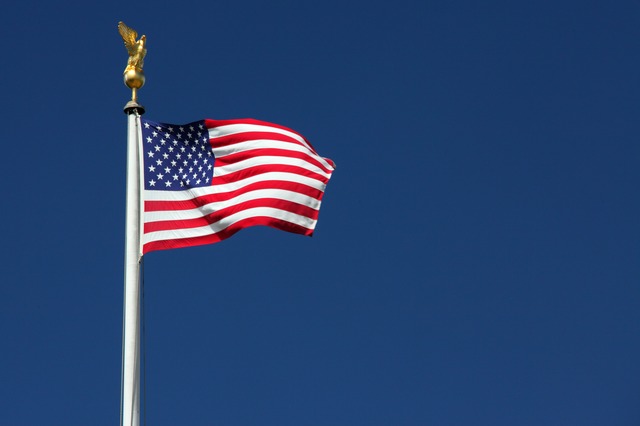Survey results show that there has been a decline in the share of Americans who believe their country “stands above” all others. The fact that the decline in people’s sense of pride is far more striking among Republicans, Paul Saunders notes, suggests that respondents blame President Obama for policies that have allowed their country to become less exceptional.
* * *
Unsurprisingly, America’s July 4 holiday—Independence Day—is usually a time of heightened patriotism and national pride. This year, however, the American people may have been a little less enthusiastic about their country, the Pew Research Center reported in new survey findings. [ www.pewresearch.org/fact-tank/2014/07/02/most-americans-think-the-u-s-is-great-but-fewer-say-its-the-greatest/ ] Less clear is why.

According to the survey, the share of Americans who believe that “the US stands above all other countries in the world” declined from 38% in 2011 to 28% in 2014. The newly disaffected were roughly divided between people who said that “the US is one of the greatest countries, along with others, up five percentage points from 53% to 58%, and those who responded that “there are other countries that are better than the US,” up four points from 8% to 12%. The Pew Research Center conducted the study earlier this year, in late February and early March.
Perhaps most striking, the decline in American exceptionalist sentiment was strongest among Republicans. The share of GOP-leaning respondents stating that “the US stands above all other countries in the world” declined from 52% to 37%—a drop of 15 percentage points. In other words, roughly one-sixth of all Republicans may have changed their minds. The change was only half this among Democrats and independents, where support for America’s uniqueness fell from 33% (both) to 25% and 26%, respectively.
In its analysis of this finding, the Pew Research Center does not attempt to explain this very substantial shift in Americans’ attitudes. Logically, however, there are two broad possibilities: a sense that America is becoming less special or, alternatively, the view that one or more other nations are becoming more important.
Is America Becoming Less Important?
Taking the latter possibility first, Americans have demonstrably noticed China’s rise; many other surveys have already found growing anxiety about this. [ https://www.tkfd.or.jp/en/research/detail.php?id=492 ] Some polls have even shown that a large share of Americans believe mistakenly that China’s economy is already bigger than the US economy. Nevertheless, while China is increasingly assertive in the East China Sea and the South China Sea, Beijing is far from winning a dominant role there and has not substantially strengthened its position during the last three years. Nor has China been a real leader on any highly visible international issue.
No less important, it would not be easy to explain why the shift in Republican opinion on America’s exceptional status would be twice as large as the change in views among Democrats and independents by talking about China or, for that matter, about Russia, which was slowly annexing Crimea while the survey was underway. Republicans tend to be somewhat more focused on international issues, but the difference is minimal and could probably not explain the two-to-one gap between Republicans, on one hand, and Democrats and independents, on the other.
The other broad explanation for the decline in support for the view that America “stands above” other countries would be a change in how Americans see their own nation. This may not be too surprising in the wake of the 2008 financial crisis and relatively slow post-crisis growth and job creation. Many Americans are visibly discouraged and even angry on the left and the right—something that has contributed to growing populism on both ends of the political spectrum, in the Tea Party and the Occupy protest movement.
Moreover, this logic does allow for a big difference in how Republicans and Democrats see the situation. Supporters of both parties—and independents—are surely experiencing many of the same challenges and disappointments in America’s post-crisis economy. But they probably have very different explanations for it—with Republicans far more likely to blame President Barack Obama.
In 2011, many GOP supporters may have expected Obama’s defeat in the 2012 presidential election, but it didn’t happen. Not a small number of these Republicans believes that Mr. Obama is ruining the country, not only economically but also in many other ways through his policies on healthcare, immigration, and same-sex marriage, for example. Some libertarian Republicans might add National Security Agency electronic surveillance to this list. As a group, these are the Republicans who say that they no longer recognize their own country—and don’t like it.
If this is an accurate explanation for the considerable drop in the share of Republicans who believe that America “stands above” other nations, it may have important consequences moving into the 2014 Congressional election cycle. Americans (and Japanese, Chinese, Russians, Germans, Brazilians, Egyptians, and most others) want to be proud of their country—just look at the global attention to soccer’s World Cup. American Republicans particularly want this sense of pride. The fact that some appear to be losing it could create significant opportunities for candidates campaigning on patriotism and, of course, against President Obama. As a result, partisan rhetoric may become even more extreme.
The US Congress is scheduled to begin a month-long recess on August 4, when House members and one-third of Senators will return to their districts and states to campaign for re-election. Even after they return to Washington in September, their time and attention will be focused overwhelmingly on the November 4 voting. The next few months will show whether pride in America becomes a major campaign issue.
